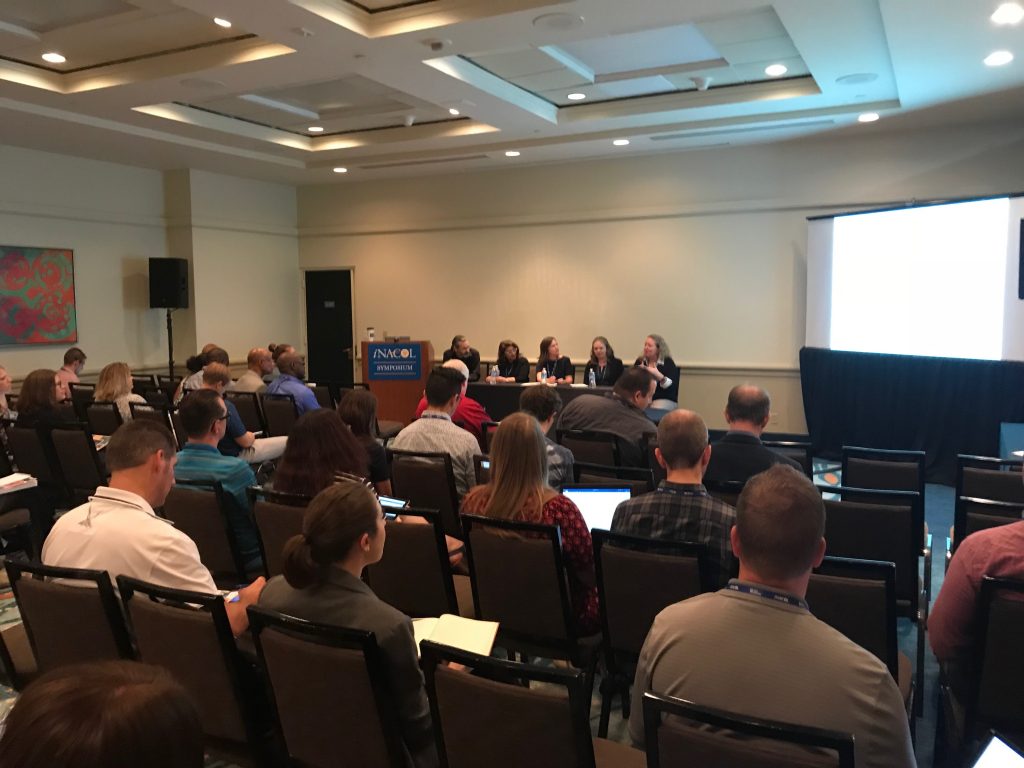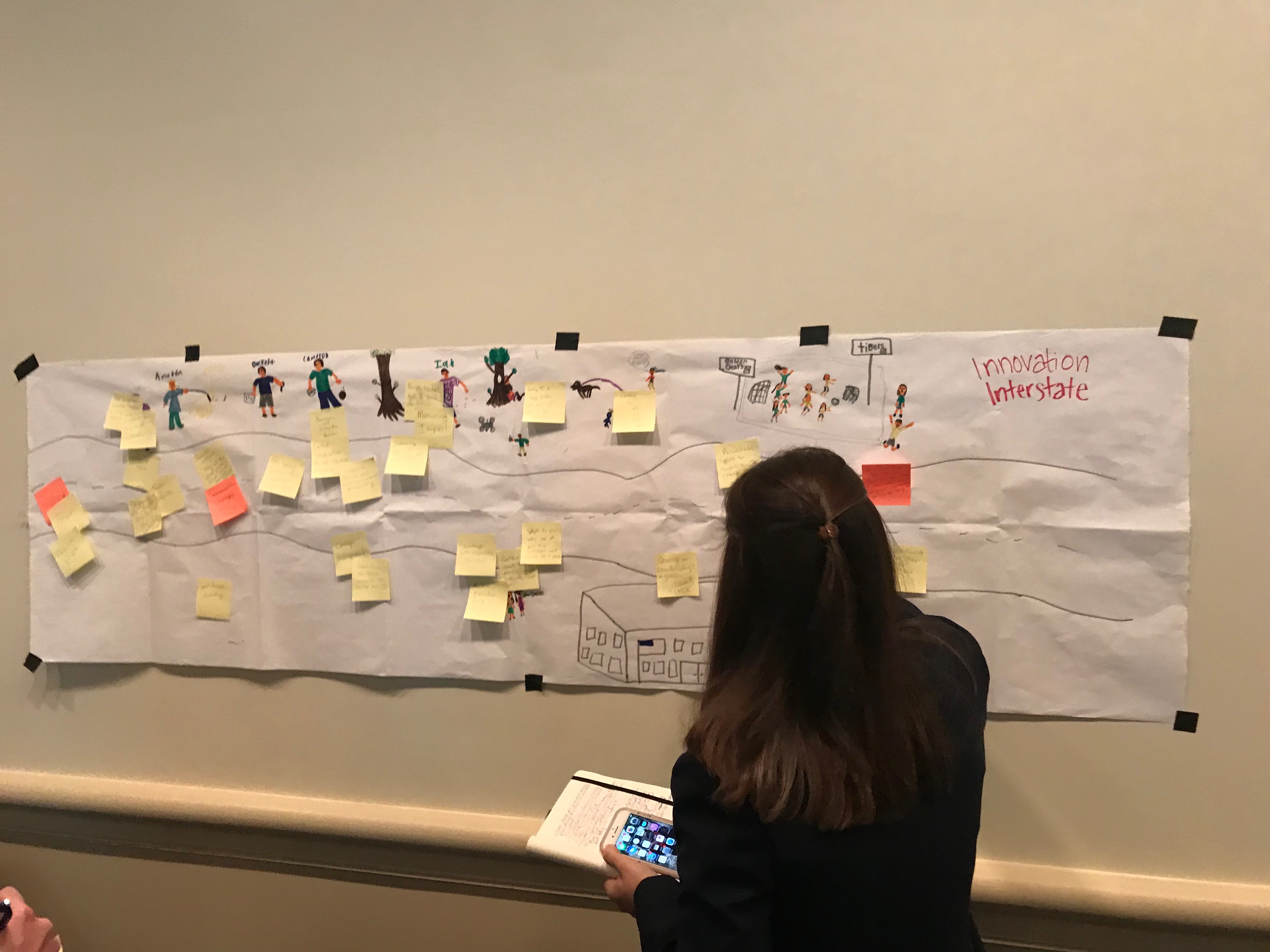Panel of national experts at iNACOL conference offer specific examples, case studies for operators
October 24, 2017
Blog Summary:
The panel of national experts offered opinions and guidance based on their experience in implementing innovative school models. Some key takeaways from the session included:
- Focus on change management and communications: move beyond individuals and change the culture – from students in the classroom to the board.
- Expect success, but manage expectations: academic results will take time to measure and performance may decline initially. Set realistic expectations from the outset and focus on effective communication.
- Don’t allow past practices or bureaucratic structures to inhibit innovation: find a point person to help innovative schools navigate central supports in the short-term, and identify structures that must evolve in the long-term.
In October, Afton’s Scott Milam and Katie Morrison-Reed participated in iNACOL’s annual symposium, which is a leading event for K-12 educators advancing the future of education through personalized learning. Afton Partners continues to be a leader in planning for the sustainability of innovative models, and has supported numerous personalized learning initiatives across the country over the past six years, including programs such as Next Generation Learning Challenges (NGLC) National Grants, Next Generation Systems Initiative (NGSI), Raising Blended Learners (a Texas statewide blended learning initiative), and Breakthrough Schools Regional Programs in multiple cities.

Afton led a highly attended panel discussion, “Sustaining a Breakthrough Model: Case Studies on How to Support Innovation That Lasts.” In this panel discussion, panelists shared their lessons learned in implementing, sustaining, and scaling personalized learning models. Our panelists came from a wide range of backgrounds, enabling a variety of perspectives, including district and charter leaders at both the school and central office level. Panelists included:
- Sujata Bhatt, Managing Partner of Innovation, Boston Public Schools
- Amy Dodson, LRC/Blended Learning Director, Cisco ISD
- Jennifer Ferrari, VP & Chief Schools Officer, Distinctive Schools
- Beth Rabbitt, CEO, The Learning Accelerator
- Matthew Riggan, Co-Founder, Workshop School, School District of Philadelphia
Our panelists shared some strategies that have worked, and pitfalls to avoid, including:
Focus on change management and communications
Communications was emphasized by many on the panel as being crucial to successfully sustaining and scaling innovative school models. “Focus on the story, not the data,” says Amy Dodson. “Compelling stories can help communicate the purpose of innovation and the successes that are experienced along the way, even when it’s too early for conclusive data.”
Additional guidance included:
- “Avoid making this [innovation] about a person or becoming personality-driven. Communication is really important. Don’t let positive OR negative personalities drive the process. Develop a consistent message and communications strategy.” – Amy Dodson
- “When moving from initial pilots to scaling, the depth of bench is remarkably shallow. To deepen it, bring staff on board earlier in the process, share what has worked (and not worked). Having a clear, coherent vision is crucial.” – Beth Rabbitt
- “Who is doing the work? If teachers are doing all the work, then the model is not sustainable.” – Sujata Bhatt
- “Implement a valuable strategic planning process, not one that just leaves a pretty report on somebody’s bookshelf, gathering dust.”- Jennifer Ferrari
- “Move to students from teachers and leaders. Students should demand a new way of teaching and learning, which can help sustain an innovative model.” – Amy Dodson
Expect success, but manage expectations
- “We don’t celebrate mediocrity. When our football team goes 6-4 (or wins 60% of their games, like some of Cisco’s passing scores) are we holding a parade?” – Amy Dodson in explaining why expectations need to be higher.
- “It takes a while to see results. Be clear with stakeholders and set expectations.” -Beth Rabbitt
- “Innovation means results may DROP before they improve.” – Sujata Bhatt
- “Value teaching as opposed to content.” – Matt Riggan
Don’t allow past practice or bureaucratic structures to inhibit innovation
- “Coordinate across departments. Don’t overburden school leaders.” – Sujata Bhatt
- “Identify a single point of contact within the organization (i.e. District).”- Matthew Riggan in discussing how central office can support innovative schools.
- “When at (another district), we called the central office the “Death Star.” I now work at the “Death Star”, promoting innovation” – Sujata Bhatt noting that districts are evolving.
- “Be careful of the playbook. As soon as you hand over a playbook, innovation can end. And also, do not demonize the past.” – Jennifer Ferrari

(Photo caption: Innovate interstate exercise)
We extend our heartfelt “Thank You!” to our panelists and all who joined us for this engaging session. If you are working on a personalized learning initiative, please see our case studies on planning for sustainability and scale of innovative models.